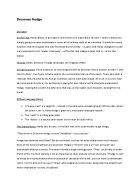The reader is forced to very rapidly deduce the persona’s emotions. He wishes that his emotions would fade; perhaps he can’t face the pain of rejection? In any case, it is implied that his emotional life is still very much alive – it has yet to wither.
Second Stanza Notes: ‘For then, I, undistrest’ opens the second stanza. This is a complex line; ‘For then’ means ‘because’, due to the inverted commas around the ‘I’. ‘Undistrest’ is an archaic spelling of ‘un-distressed’ – meaning ‘not worried’. Note Hardy’s use of this word (diction). ‘Distress’ is an intrinsically negative word but by putting a negative prefix it becomes positive. However, the presence of two negative words in the line reflects oddly on its meaning and the impression given.
Hardy does this for a reason. “For then, I, undistressed/ By hearts grown cold to me/ Could lonely wait my endless rest/ With equanimity.” Very simply, Hardy’s persona is stating that, if his heart had shrunk, he would be able to wait out his life ‘with equanimity’ – with a calm temperament. However, the presence of the ‘For then’ makes this stanza conditional, again implying that the persona is ‘without equanimity’ – he’s not brilliantly happy. He is losing emotional contact with those whom he still cares for. The emotional entities, contrasting the physical ones described in the first stanza, are once again reflected by enjambment; “Undistressed/ By hearts grown cold to me”.
Some key techniques/ words in this stanza:
-
“Could lonely wait my endless rest.” – lonely, due to the ‘hearts grown cold to [him]’, obviously, but critics query the meaning of ‘endless rest’. Does is refer to death? The persona’s remaining life certainly won’t be ‘endless’. What does Hardy mean by this? Could it merely be a forced rhyme for ‘undistressed’?
-
“With equanimity” – Again, perhaps this is another forced rhyme, yet the calm metre reflects the expressed ‘calmness’. However (this applies to the entirety of the stanza), the reader’s association of intrinsic ‘goodness’ with ‘calmness’ is reversed by the conditional nature of the poem. Hardy’s persona wants to be calm and have his emotional life wither, as to reduce the pain of loss – a confusing idea in itself – but this has not happened.
Third Stanza: Hardy arrives at the crux of the poem, with a comment on the cruel nature of Time. ‘Time’ is personified as an enemy of the human condition; it “Part steals, lets part abide”, apparently “to make [the persona] grieve”. Time removes (‘part steals’) the persona’s physical properties; his skin wastes etc. but Time lets his emotional passions remain intact – making relationships more painful as they deteriorate in old age.
Hardy end his poem with the lines “And [Time] shakes this fragile frame at eve/ With throbbings of noontide”. These are vitally important lines. Within them, Hardy compares his persona’s life with a single day – diurnal imagery. They include a great deal of emotive imagery; ‘shakes’ and ‘with throbbings’. The latter reflects the throbbing of a heart. Hardy, to explain the metaphor, states that his persona is reminded at the ‘eve’ (end) of his life by the mental throbbing of his emotional height – his pinnacle of passion, to put it poetically. Critics have called it a very emotionally overt ending, with a somewhat forced rhyme-scheme once again. You decide.








